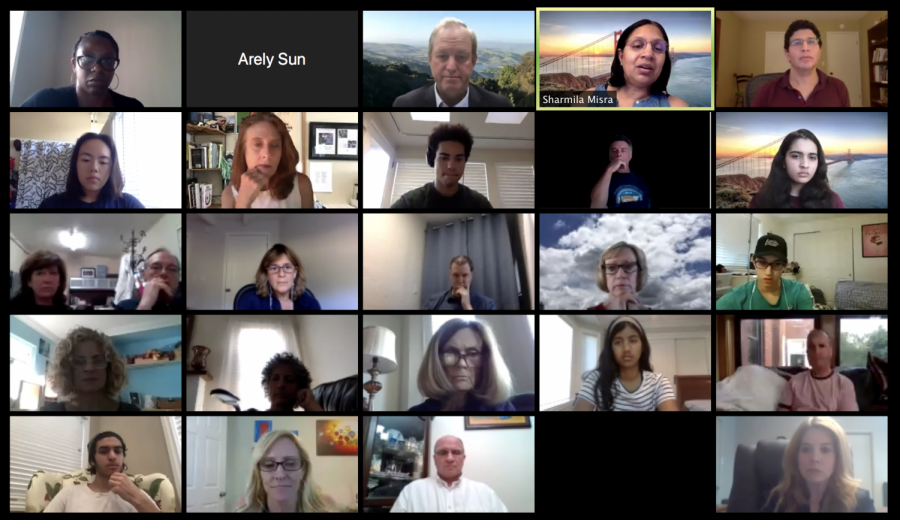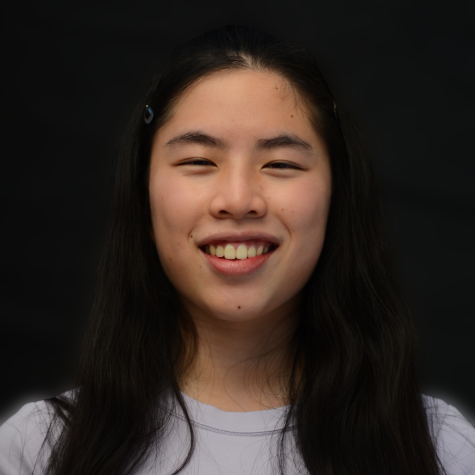Town hall discussion explores solutions for racism at Harker
Middle school computer science teacher Sharmila Misra offers her opinion during the town hall last Tuesday. This event took place in light of the racism towards African American students at Harker and the Black Lives Matter (BLM) protesters across the nation.
June 23, 2020
Why are there so few African American and Latinx students at Harker? What should the school do to be more inclusive? Is there a way for the school to be more transparent with consequences for racial incidents on campus?
Over 170 Harker faculty, staff and students from sixth to 12th grade gathered via Zoom to raise questions and concerns regarding racism at Harker last Tuesday. The town hall spanned 90 minutes and was organized by the Diversity, Equity and Inclusion Committee and members of administration.
Similar to the community vigil that took place on June 4, this town hall took place in light of the racism towards African American students at Harker and Black Lives Matter (BLM) protesters calling for change across the nation and the world.
The event served as an open forum for attendees to share with the administration their thoughts about racial diversity at Harker and their ideas for solutions they want to see implemented. Community members also had the option of sending chats, which were read out loud by Latinx upper school art teacher Pilar Aguero-Esparza. Assistant head of middle school Patricia Burrows, who is Asian Canadian, and upper school Spanish teacher Abel Olivas, who is Latinx, moderated the discussion, redirecting attention to new questions and adding in their own reflections on the comments made.
Attendees raised concerns about diversity issues in the school community. They spoke about the lack of Black and Latinx Harker students, unreported microaggressions on campus, ways that the Harker admissions process is disadvantageous towards minority students and a lack of transparency about racial incidents.
African American lower and middle school assistant athletic director Karriem Stinson thanked those who shared their views and encouraged others to speak up.
“Right now is not a time to be silent,” Stinson said. “I work at an institution [where] not a lot of people look like me. This is about everybody learning. This is about things that’s happened a long time, and now it’s come to light and people are all saying, ‘Oh, yeah, Black lives matter.’ Since I’ve been a baby, Black lives mattered to me. It’s not a fad to jump on. Don’t be scared to talk.”
Upper school director of learning, innovation and design Diane Main, who is white, attended both this town hall and the town hall last Wednesday from 6 p.m. to 8 p.m. for parents and alumni, which saw over 200 attendees. During the second town hall, she was reminded of a past racial incident on social media that she was not made aware of until well after it had happened. She believes that more transparency about racial incidents is needed in order for teachers to better support students on campus.
“The entire student body knew about it, and kids were waiting for the school to respond in some way, like have an assembly or some kind of gathering about it and talk about it openly, and the kids were frustrated that that never happened,” Main said in an interview with Harker Aquila after the event. “We as teachers weren’t able to respond because we just didn’t know. For me to be able to do my job as an educator as best as I can, I need to know what’s going on in our community.”
Students, faculty and staff suggested to the administration different ways for the school to increase acceptance of diversity on campus. Community members called for affinity groups for different races, a zero tolerance policy for racial incidents on campus and more events like Challenge Day, where students can feel comfortable sharing their racial experiences.
“I really think that our community needs to be the kind of community that has these messy conversations all the time,” upper school math teacher Dr. Lola Muldrew, currently one of only two Black teachers at the upper school, said. “I’ve never worked at a school before that didn’t acknowledge and do something for Martin Luther King Day. Harker never does. [Harker] doesn’t acknowledge Black History Month. We can’t have these conversations every now and then.”
Asian American rising senior Anika Fuloria talked about adding in more literature works from Latinx, Indigenous, Asian, LGBTQ+, Jewish and Muslim authors to the English curriculum. She hopes to inspire more acceptance of diversity at Harker by encouraging others to learn about different cultures through reading literature.
“One way to increase diversity on campus is to really celebrate the people who we do have, and uplift them so that more people who are Black or Latinx might want to join Harker,” Anika said in an interview after the town hall.
Attendees also suggested that the administration hire a diversity director, work towards having a more racially diverse faculty and bring in more students from different socioeconomic backgrounds through making financial aid available to a greater number of students.
African American rising senior Brian Pinkston, who has experienced racism at Harker, spoke up with a suggestion for educating students on racial issues.
“More than just one-time speakers, we need classes such as the ethnic studies and the social justice classes to be required so that all students can recognize these issues, what benefits we have and how we can help those that aren’t benefitted by what we have,” Brian said.
African American Diversity Committee co-chair Tyeshia Brown introduced the new Diversity, Equity and Inclusion (DEI) section now available on the Harker portal, where anti-racism resources are available for community members to browse through.
To conclude the town hall, head of school Brian Yager, who is white, spoke about initiatives that the administration has committed to carrying out. Harker has begun reviewing curriculum content, will add in yearly anti-bias and anti-racist training for all staff and will require senior administration members to attend future DEI conferences.
In addition to re-evaluating the structure for Harker’s DEI program, the school also plans to send out the National Association of Independent Schools’ Assessment of Inclusivity and Multiculturalism (AIM) survey in the fall to the Harker community to gather information about the school’s environment of inclusion.
“I want to acknowledge that I have failed to reach out individually to the Black and African American members of the Harker staff and to connect with them and let them know that we support them,” Yager said. “I want to apologize to my colleagues at Harker as well as to our [African American] students, who I know are feeling unacknowledged or unsupported at this time.”
In an email sent to town hall attendees after the event, Yager and the Harker Diversity Committee announced that they will publicize a summary of the town halls along with the school’s plans for increasing diversity this week.
The community vigil and the town halls signified the administration’s efforts to publicly acknowledge racial challenges that minority students face at Harker today and work towards fostering a school culture that is more welcoming and inclusive. These events served as a platform for the Harker community to demand for change, and many community members expressed their desire to continue having these discussions about racism in the future.
“We just cannot be silent as a community,” director of performing arts Laura Lang-Ree said during the vigil. “I’m craving a more school-wide systemic look at who we are as Harker and what is not acceptable. This privilege that we have as a collective unit, we’ve got the power to do something with it.”
Harker community members with ideas or questions to share with the Harker Diversity Committee can email [email protected].


















![“[Building nerf blasters] became this outlet of creativity for me that hasn't been matched by anything else. The process [of] making a build complete to your desire is such a painstakingly difficult process, but I've had to learn from [the skills needed from] soldering to proper painting. There's so many different options for everything, if you think about it, it exists. The best part is [that] if it doesn't exist, you can build it yourself," Ishaan Parate said.](https://harkeraquila.com/wp-content/uploads/2022/08/DSC_8149-900x604.jpg)




![“When I came into high school, I was ready to be a follower. But DECA was a game changer for me. It helped me overcome my fear of public speaking, and it's played such a major role in who I've become today. To be able to successfully lead a chapter of 150 students, an officer team and be one of the upperclassmen I once really admired is something I'm [really] proud of,” Anvitha Tummala ('21) said.](https://harkeraquila.com/wp-content/uploads/2021/07/Screen-Shot-2021-07-25-at-9.50.05-AM-900x594.png)







![“I think getting up in the morning and having a sense of purpose [is exciting]. I think without a certain amount of drive, life is kind of obsolete and mundane, and I think having that every single day is what makes each day unique and kind of makes life exciting,” Neymika Jain (12) said.](https://harkeraquila.com/wp-content/uploads/2017/06/Screen-Shot-2017-06-03-at-4.54.16-PM.png)








![“My slogan is ‘slow feet, don’t eat, and I’m hungry.’ You need to run fast to get where you are–you aren't going to get those championships if you aren't fast,” Angel Cervantes (12) said. “I want to do well in school on my tests and in track and win championships for my team. I live by that, [and] I can do that anywhere: in the classroom or on the field.”](https://harkeraquila.com/wp-content/uploads/2018/06/DSC5146-900x601.jpg)
![“[Volleyball has] taught me how to fall correctly, and another thing it taught is that you don’t have to be the best at something to be good at it. If you just hit the ball in a smart way, then it still scores points and you’re good at it. You could be a background player and still make a much bigger impact on the team than you would think,” Anya Gert (’20) said.](https://harkeraquila.com/wp-content/uploads/2020/06/AnnaGert_JinTuan_HoHPhotoEdited-600x900.jpeg)

![“I'm not nearly there yet, but [my confidence has] definitely been getting better since I was pretty shy and timid coming into Harker my freshman year. I know that there's a lot of people that are really confident in what they do, and I really admire them. Everyone's so driven and that has really pushed me to kind of try to find my own place in high school and be more confident,” Alyssa Huang (’20) said.](https://harkeraquila.com/wp-content/uploads/2020/06/AlyssaHuang_EmilyChen_HoHPhoto-900x749.jpeg)









